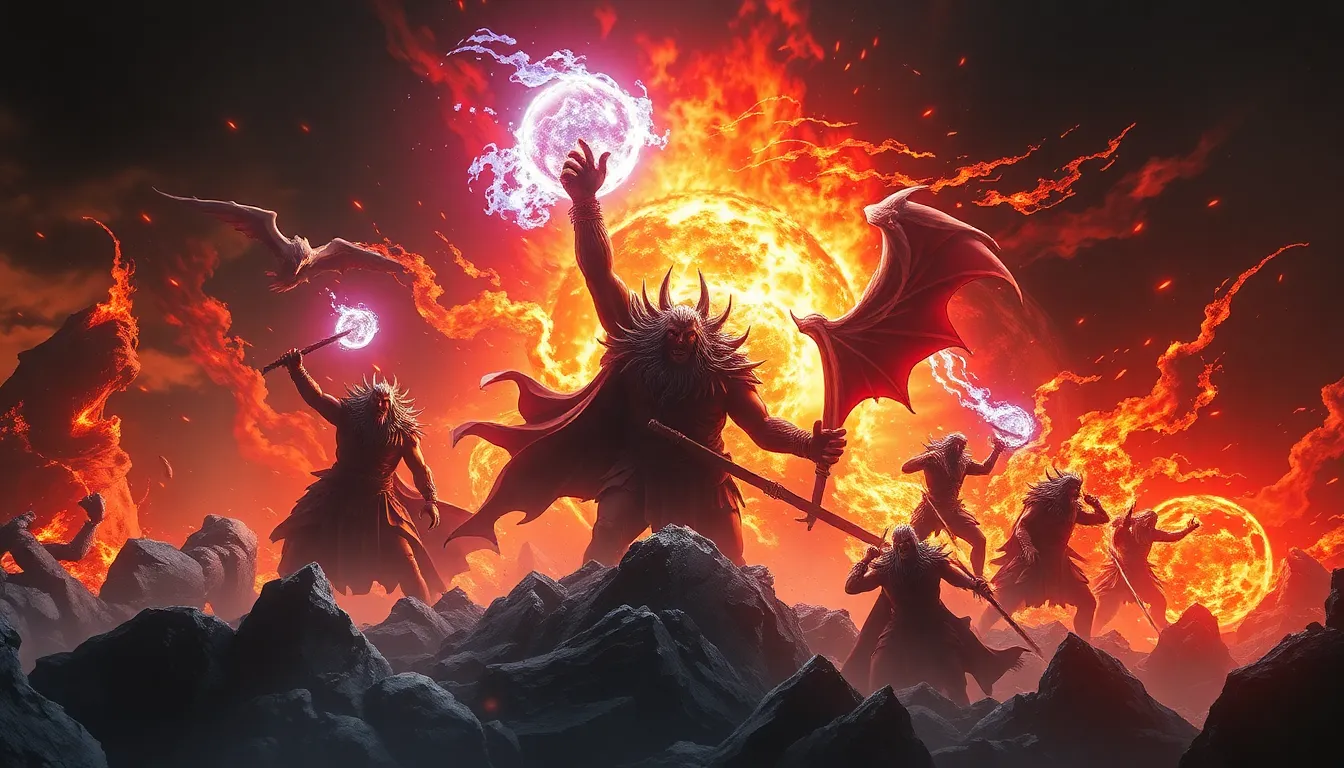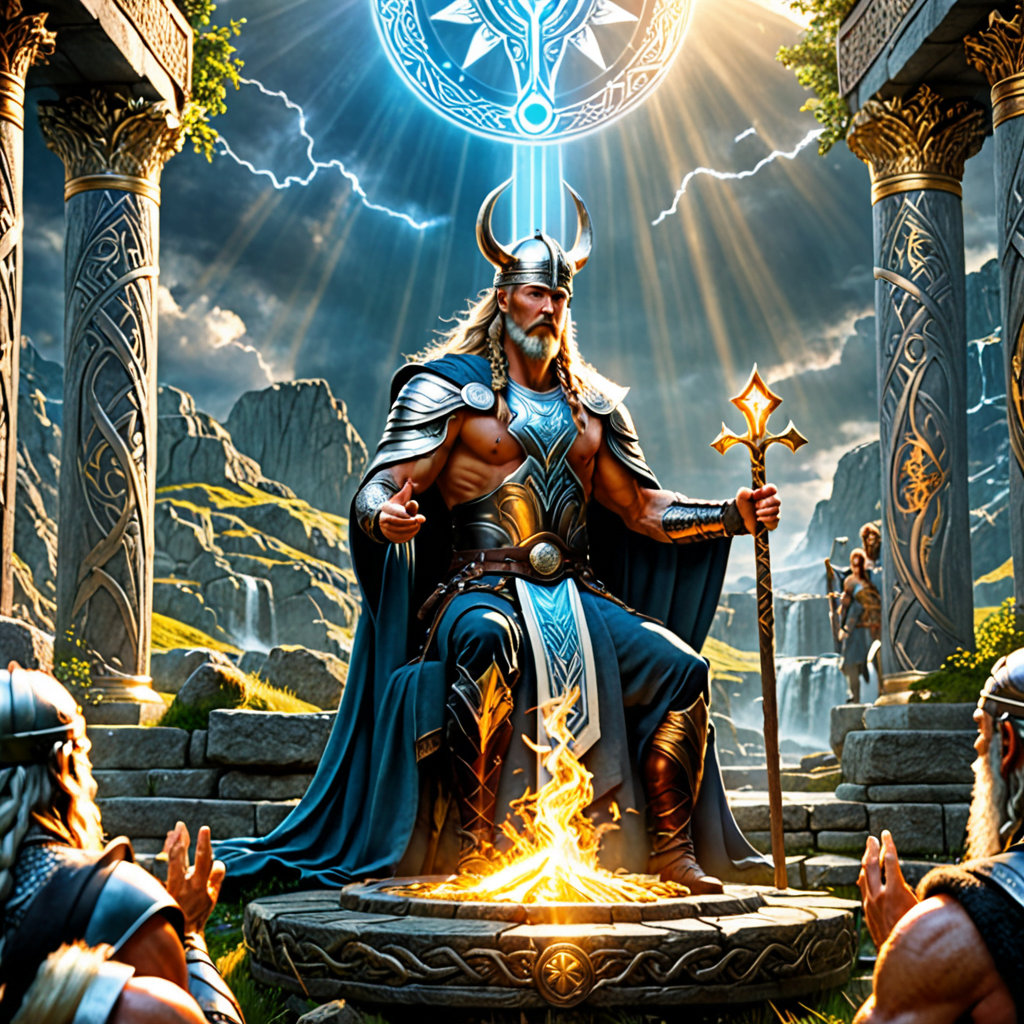The Titans’ Rage: Legendary Battles of Mythology
I. Introduction
The Titans, in mythology, are colossal deities that predate the Olympian gods, representing the primal forces of the universe. Originating mainly from Greek mythology, they embody various elements of nature and human experience, such as strength, wisdom, and chaos. Their significance stretches beyond Greece, influencing mythologies across cultures, where they often represent the struggle between order and chaos, power and rebellion.
This article aims to explore the legendary battles involving Titans, delving into their origins, notable conflicts, and the implications of these mythological narratives in both ancient and modern contexts.
II. The Origins of the Titans
The Titans were born from the primordial entities, Gaia (Earth) and Uranus (Sky), representing the very foundation of existence. In various creation myths, they symbolize the initial order of the universe before the emergence of more complex deities.
Key figures among the Titans include:
- Cronus: The leader of the Titans, known for his role in the overthrow of his father, Uranus.
- Rhea: The sister and wife of Cronus, who played a crucial role in the survival of the Olympian gods.
These Titans embodied the cosmic order, maintaining balance until their reign was challenged by the Olympians.
III. The Titanomachy: The Battle for Supremacy
The Titanomachy refers to the epic ten-year war between the Titans and the Olympian gods, primarily led by Zeus. This conflict represents a critical power struggle in Greek mythology, marking the transition from the old order of Titans to the new order of Olympians.
Major players in this conflict included:
- The Titans: Powerful and ancient beings who ruled during the Golden Age.
- The Olympian gods: The new generation of deities, including Zeus, Hera, Poseidon, and Athena.
Key battles during the Titanomachy saw the Olympians employing cunning strategies, including forging alliances with the Cyclopes and the Hecatoncheires (hundred-handed giants), to ultimately overthrow the Titans.
IV. Notable Titan Battles in Greek Mythology
Several significant battles highlight the Titans’ tumultuous relationship with the Olympian gods:
A. Cronus vs. Zeus: The Overthrow of a Father
The battle between Cronus and Zeus is perhaps the most famous, representing the cyclical nature of power and the rebellion of the younger generation against the older. Zeus, hidden by Rhea, ultimately confronted Cronus and freed his swallowed siblings, leading to the climactic battle that ended Cronus’s reign.
B. Atlas: The Punishment and the Weight of the World
Atlas, a Titan condemned to hold up the sky as punishment for his role in the Titanomachy, symbolizes the burden of responsibility. His eternal struggle resonates with themes of endurance and sacrifice, as he bears the weight of the cosmos.
C. Prometheus: The Rebellion Against Divine Order
Prometheus, another Titan, defied the gods by stealing fire and giving it to humanity. His act of rebellion not only showcases the Titan’s defiance but also emphasizes the battle for knowledge and enlightenment against divine authority.
V. Titans in Other Mythologies
While Titans are primarily associated with Greek mythology, similar figures appear in various cultures:
A. Comparison of Titans in Roman Mythology
Roman mythology adopted the Greek Titans, often renaming them. For instance, Cronus became Saturn, and the conflicts remained similar, reflecting the cultural exchange between the two civilizations.
B. Titans in Hindu Mythology: The Asuras
In Hindu mythology, the Asuras are akin to Titans, often depicted as powerful beings who oppose the Devas (gods). Their battles symbolize the ongoing struggle between good and evil, order and chaos.
C. Titans in Norse Mythology: Jotnar and Their Battles
The Jotnar, or giants, in Norse mythology represent chaos and are often in conflict with the Aesir gods. This ongoing battle underscores the theme of duality present in many mythologies, where order must constantly contend with chaos.
VI. The Symbolism of Titan Battles
The battles fought by Titans carry deep symbolic meanings:
A. The Struggle Between Chaos and Order
The conflict between Titans and Olympians illustrates the universal struggle between chaos (represented by the Titans) and order (embodied by the Olympians).
B. The Theme of Rebellion Against Authority
Many Titan stories reflect the theme of defiance against established authority, showcasing the inevitable rise of the younger generation against their predecessors.
C. The Portrayal of Power Dynamics in Mythology
The dynamics of power shifts during these battles reveal insights into human nature and societal structures, emphasizing the cyclical nature of power.
VII. The Aftermath of Titan Battles
The aftermath of the Titan battles had profound implications for mythology:
A. Consequences for the Defeated Titans
Defeated Titans faced severe consequences, often being imprisoned in Tartarus, reflecting the cost of their rebellion.
B. The Rise of the Olympians and Their Rule
The Olympians’ victory marked the beginning of a new age, where they established their dominion over the cosmos and humanity.
C. The Lasting Impact of Titan Battles on Subsequent Myths
The Titan battles set the stage for countless myths, influencing narratives of conflict, power, and morality in various cultures.
VIII. Modern Interpretations of Titan Battles
Today, Titan battles continue to resonate through various forms of media:
A. Representation in Literature and Art
Artists and writers often draw inspiration from Titan stories, using them to explore themes of power and rebellion.
B. Titan Battles in Film and Popular Culture
Films like “Clash of the Titans” and “Immortals” highlight the dramatic nature of these legendary battles, bringing them to contemporary audiences.
C. The Relevance of Titan Mythology in Contemporary Society
The themes present in Titan mythology remain relevant, as they reflect ongoing societal struggles with authority, power, and the quest for knowledge.
IX. Lessons from the Legends
The stories of Titan battles offer valuable lessons:
A. Morals and Teachings Derived from Titan Battles
These myths often impart morals regarding the consequences of rebellion and the importance of wisdom in leadership.
B. The Relevance of These Myths in Understanding Human Nature
They provide insight into the complexities of human nature, illustrating the perpetual conflict between ambition and responsibility.
C. The Enduring Legacy of Titans in Storytelling
The narrative of Titans continues to inspire storytelling, emphasizing the timeless nature of their struggles and triumphs.
X. Conclusion
The Titans hold a significant place in mythology, representing primal forces and the complex interplay of power. Their legendary battles not only shaped ancient narratives but continue to influence modern culture, highlighting the universal themes of conflict, rebellion, and the quest for order.
In reflecting on the impact of these battles, we can appreciate the enduring fascination with Titans and their stories, which resonate with humanity’s ongoing struggles for power, identity, and understanding in an ever-changing world.


